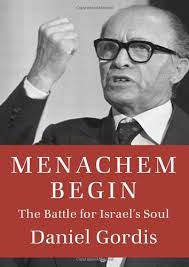 Daniel Gordis, Menachem Begin: The Battle for Israel’s Soul (New York: Schocken Books, 2014). Hardback
Daniel Gordis, Menachem Begin: The Battle for Israel’s Soul (New York: Schocken Books, 2014). Hardback
“The state begins in violence. However lofty the ideals of a new country or a new regime, if it encounters opposition, as most new regimes and countries do, it must fight. If it loses, its ideals join the long catalogue of unfulfilled aspirations.”
Richard Brookhiser wrote those words at the outset of Founding Father, his study of George Washington. I thought of them often as I read Menachem Begin, Daniel Gordis’ new book on the life and character of Israel’s sixth prime minister.
The history of few states has been attended by such perpetual violence as has that of Israel. Its founding Zionist ideal was a response to anti-Semitic violence, at least in part. (The other part was the millennia-long Jewish hope of return to Jerusalem.) Its independence was gained through terrorism against the British Mandate and battles with invading Arab armies. Its history has been beset by life-and-death wars against neighboring Arab countries, not to mention constant conflict with Palestinians. And then there are the fractious relationships among Israelis. (“Two Israelis, three political parties” is a joke I heard decades ago.) The name Israel means “one who wrestles with God,” but the wrestling has been with humans too.
Menachem Begin participated in many of those struggles. He was born on August 16, 1913, in Brest-Litovsk, Poland, to Zionist parents. At age 13, he embraced the distinctive Revisionist Zionism of Vladimir (Ze’ev) Jabotinsky, who advocated the establishment of the Jewish State in Israel—by force, if necessary. He entered his twenties with the Nazis taking power in Germany, and fled Poland after Germany invaded on September 1, 1939. He would eventually lose his parents and brothers in the Holocaust. He was arrested by the Soviets in Vilna and detained there for a year for anti-Soviet, anti-Communist activities. Released in September 1941, he and his wife Aliza made their way to Palestine by spring of the next year.
There, he quickly assumed command of Etzel, an acronym for Irgun Tzvai-Leumi, the “National Military Organization.” This Jabotinsky-inspired paramilitary group used violence to drive the British out of Palestine. Controversially, Begin gave the orders to hang two British sergeants as retaliation for the hanging of two Etzel fighters. He gave the orders to bomb the King David Hotel in Jerusalem, which housed the British Mandatory government. And his organization, together with the more radical organization Lehi (aka, Stern Gang), was responsible for the massacre at Deir Yassin, in which 107 Arab residents were killed. The mainstream Haganah both foreknew and approved of the King David and Deir Yassin operations, though they denied it at the time, a denial that permanently blackened Begin’s reputation.
When the British evacuated Palestine, the war for independence and against the Arabs began in earnest. Haganah, Etzel, and Lehi combined to form the Israeli Defense Forces, though conflicts among those organizations led to the Altalena affair, in which Haganah forces (including Yitzhak Rabin) fired on a supply ship being unloaded by Etzel personnel (including Menachem Begin). The pre-independence conflicts led to the formation of rival political parties after 1948. For 29 years—from 1948 to 1977—Begin led the opposition. Then, on the verge of wanting to retire, he became Israel’s prime minister.
Those years saw highs and lows. Under Begin, Israel gave refuge to Vietnamese boat people. It began to receive an influx of Soviet Jews. It began to airlift Felasha Jews out of Ethiopia. Most importantly, Begin negotiated peace with Anwar Sadat’s Egypt, the first Arab country to recognize Israel as a Jewish state. (And, it should be noticed, the peace has held till now.)
More controversially, under Begin, Israel expanded the Settlement Movement that had begun under the previous government. (Israel had captured the West Bank, Gaza, and Sinai Peninsula during the Six Day War, and had begun building settlements not long afterward.) Most controversially, with Ariel Sharon as Begin’s defense minister, Israel invaded Lebanon, and its Lebanese Christian allies massacred Lebanese Shiites and Palestinians in the Sabra neighborhood of Beirut near the Shatilla refugee camp.
So, how does one assess the legacy of Menachem Begin? Should one emphasize the hanging of two British sergeants, the King David Hotel bombing, the Deir Yassin massacre, the Settlement Movement, and the Sabra and Shatilla massacre and decide that Begin was a terrorist and a tyrant?
Or, should one assess his legacy focusing on his struggle to establish the Jewish state as a refuge from anti-Semitism; his government’s benevolence to Vietnamese boat people and Ethiopian and Soviet Jews; and especially his Nobel Peace price-winning negotiations with Egypt and decide that he was a great statesman and man of peace?
Daniel Gordis’ biography makes a compelling case for the latter, one that I find, in the main, convincing. Begin’s Zionist ideals, precisely because of his lifetime of Zionist efforts, will not join the list of unfulfilled aspirations any time soon. By the same token, however, we can never forget that precisely because all states begin in violence, none of them—including Israel—are entirely beyond reproach.
P.S. If you found this review helpful, please vote “Yes” on my Amazon.com review page.


In order to understand Israel present, one must understand Israel past. Ada Israel.
I found this review of ‘Menachem Begin’ to be fair and balanced EXCEPT it neglected to remember that immediately upon the announcement of Israel’s statehood five (count ’em) British-armed Arab nations attacked the infant Jewish state. As of this date, only Egypt has since signed a so-called peace accord with Israel; an accord it has broken several times.
And Jordan.